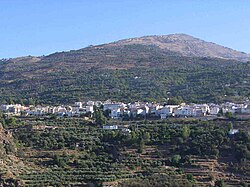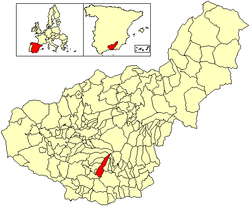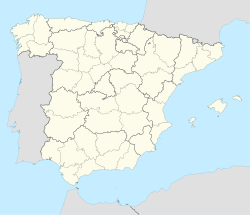Lanjarón (pronounced [laŋxaˈɾon]) is a municipality and town in the Alpujarras area in the province of Granada in Andalusia, Spain.
Lanjarón | |
|---|---|
 Lanjarón overview. | |
 Location of Lanjarón | |
| Coordinates: 36°55′N 3°28′W / 36.917°N 3.467°W | |
| Country | |
| Autonomous community | |
| Province | Granada |
| Comarca | Alpujarras |
| Judicial district | Órgiva |
| Government | |
| • Alcalde | Eric Escobedo (2020) (Spanish Partido popular - PP) |
| Area | |
• Total | 60.38 km2 (23.31 sq mi) |
| Elevation | 659 m (2,162 ft) |
| Population (2018)[1] | |
• Total | 3,485 |
| • Density | 58/km2 (150/sq mi) |
| Demonym(s) | Lanjaronense o cañonero, -ra |
| Time zone | UTC+1 (CET) |
| • Summer (DST) | UTC+2 (CEST) |
| Postal code | 18420 |
Lanjarón has a ruined castle and chalybeate baths.[2]
This spa town is most famous, however, for its eponymous bottled water company, the first ever established in Spain, whose products are sold throughout the country.
On the 23rd of June, the town of Lanjaron celebrates its annual fiesta of San Juan, known as the biggest water fight in Spain. On the night of the 23rd, people from far and wide come to celebrate the midnight madness. For one hour, starting at midnight until 1 am, the streets are packed with people and their buckets, water pistols, fire hoses and lorries filled with water.
Fountains
editLanjarón has a series of fountains distributed through the streets and plazas. Most are accompanied by a short phrase or poem, usually by Federico García Lorca, and are used by locals and visitors for drink and rest. There numerous fountains in the town, these carry chlorinated water. Then there are three fountains with fresh spring water outside of town. Also note that the local spa owns its own fountains, which costs 1 euro to tap from. Here follows a gallery with all the town fountains:
References
edit- ^ Municipal Register of Spain 2018. National Statistics Institute.
- ^ Chisholm, Hugh, ed. (1911). . Encyclopædia Britannica. Vol. 1 (11th ed.). Cambridge University Press. pp. 754–755.
External links
edit- Lanjarón Township Consejería de Medio Ambiente de la Junta de Andalucía (Ministry of Environment of the Junta de Andalucia)
- The Fiesta of San Juan
- Lanjaron, Spain Lanjaron - Visit Alpujarras: your holiday guide, travel information and rural accommodation
- Lanjaron, Spain Lanjaron - Rural accommodation


